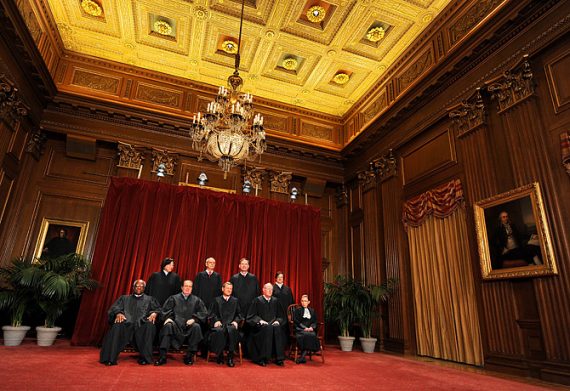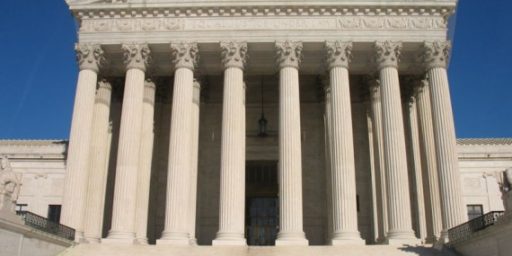A Different Take On The Roberts “Switched Vote” Hypothesis
There is another explanation for the sometimes confusing nature of the dissent in the ObamaCare case.
James Joyner notes this morning the theory that is making its way around the legal blogosphere that Chief Justice Roberts may have originally been on the side of those Justices who wanted to overturn the Affordable Care Act, and Steven Taylor has shared his thoughts on the theory as well. The theory itself is being advanced by David Bernstein of The Volokh Conspiracy among others. Orin Kerr, one of Bernstein’s co-bloggers, isn’t quite convinced of the argument and puts forward an alternative hypothesis:
[I]t might have happened like this. The Justices voted at conference and there were five votes to uphold the mandate on the tax argument and at least five votes to strike down or modify the medicaid expansion. The first group is Roberts plus the liberals, and the second group is Roberts plus the conservatives. Roberts is the swing vote in this case and this is the biggest case of his time on the Court, so he quite naturally assigns the opinion to himself. Roberts doesn’t know how many votes his opinion will get, and he tries to write in a way that might persuade some unlikely votes to join him. Maybe Justice Kennedy will change sides and make the case 6-3, which would avoid the dreaded 5-4 vote. Or maybe he can get some liberal votes to join the section blocking the medicaid expansion.
To write the opinion, Roberts needs to cover a lot of ground — anti-injunction act, tax power, medicaid expansion, etc. Roberts also writes on the Commerce Clause issue, even though it’s not needed to reach the result. Why include that section? Perhaps Roberts thinks that his middle-ground opinion that includes a section agreeing with the mandate challengers on the Commerce Clause might pick up Kennedy’s vote. Or maybe Roberts just wants to weigh in on the most high-profile legal issue of the year, which he happens to care a lot about. He’s also the fifth vote on the Commerce Clause issue and everyone else is writing on it, so he wants to make his views known. Either way, he writes a proposed majority opinion covering all the major issues.
After Chief Roberts circulates his majority opinion, the conservative dissenters decide to write a joint opinion in response. Why a joint opinion? It took Roberts a while to circulate his proposed majority opinion, so the time pressure is particularly intense on the dissenters. The dissenters have a lot to issues to cover and very little time in which to say it, and making it a joint effort allows them to pool resources. They divide the pieces with different Justices working on different issues. The result is a 65 page opinion that is a bit of a patchwork, with different parts by different Justices having different lengths and some portions not really necessary (like severability) included. Some parts may have been drafted before the Roberts opinion circulated, which might explain why parts are duplicative of the Roberts opinion. But the joint dissent is a genuine joint effort, which might explain why parts of the opinion sound like they were written by Justice Scalia and yet Justice Kennedy announced the dissent from the bench.
At the same time the conservative dissenters are writing their response to Roberts from the right, Justice Ginsburg does the same from the left. Ginsburg’s opinion ends up responding mostly to the Chief’s opinion and not the joint dissent, as many have noted. But that wasn’t because Roberts initially was on the other side. Rather, it’s because when Ginsburg was drafting her opinion, the Chief Justice’s opinion was the only one that had circulated. At that point it wasn’t clear how many votes Roberts would get, so Justice Ginsburg treated it as a potential majority opinion even though in retrospect Roberts ended up only writing for himself on the high-profile question of the Commerce Clause.
This strikes me as a somewhat more plausible explanation for what happened than the scenario that Roberts had initially been with the Scalia/Kennedy/Alito/Thomas group on all issues, including the Taxing Power argument, and then suddenly changed his mind for some reason. It’s also worth taking note of the point that Kerr makes about the time pressure that the Court was likely under with regard to this case. Oral Argument in the matter had only concluded on March 28th. It was two days later that the Court held its conference regarding the case and took its initial vote, at which point the Justices would have gotten at least a rough idea of who was in the majority on which issues. Ninety one days later, the Court handed down its decision. In the meantime, there were still cases to be reviewed for oral argument, including the Arizona immigration case, which was argued in April. I’m not suggesting that the Court rushed through its decision process here, they are used to these kind of time crunches. However, this was without question the most complicated and important case the Court had heard in some time, and it was clear from the time of oral argument that there were sharp divisions on the Court. Crafting a majority opinion in such a case was always going to be a complicated matter, and it was made so by the fact that there are actually three separate majorities, one on the tax issue, one on the Commerce Clause issue, and one on the Medicaid issue (the ruling on the Anti-Injunction Act appears to have been unanimous).
Is it possible that Roberts switched on the tax issue at some point? I suppose so, but from what we know of past Supreme Court deliberations (and we often don’t know a whole heck of a lot) it would have had to have happened in a most unusual manner. There’s no evidence, for example, that Roberts found Ginsburg’s tax argument so compelling that he decided to join that argument even though he had previously concluded that the entire act was unconstitutional. What’s more likely, is that Ginsburg and the three other members of her bloc of Justices would have preferred to uphold the mandate using the Commerce Clause but, given that they had a fifth vote from the Chief on the tax issue (and it’s likely that the four liberals already agreed that the mandate could be validated under the Taxing Power anyway), they went along with him to save the law. This strikes me as a far more plausible scenario than the one that Bernstein advances, but of course it’s a question that will remain unanswered perhaps forever..







Politically and strategically, this hypothesis makes the most sense to me.
@al-Ameda: Off topic, but, La Roja fan?
I don’t buy some of the complaints about sloppiness, but sloppiness is not unheard of in other cases. At least one theory is that Justices that appear sloppy (Kennedy) rely more on law clerks than others known to write their own first drafts. (Scalia). Ghostwriting on the Supreme Court.
@James:
I like high-end soccer and Spain is currently all of that. Also, Andres Iniesta is one of my favorite players in the world.
@al-Ameda: They’re certainly chasing history. You might like this interview with Xavi.
And then you have the opinion of Michael Savage, that noted expert on mental health issues, who believes that Roberts’ epilepsy contributed to his confusion.
This is a golden opportunity for Romney to go full Gingrich. He should announce today that he will ask congress to subpoena Roberts on day one and start the impeachment process as soon as they come up with an excuse to do so.
@bk:
It is interesting how conservatives like Savage (aka Weiner) who hate everything liberal, choose to live in the liberal places – Savage-Weiner lives in the People’s Republic of Marin County, just across from San Francisco. Why not Columbia, SC or Oklahoma City, or Wichita or Indianapolis?
@al-Ameda: My suspicion is conservatives like Savage want to enjoy all the benefits of a cosmopolitan urban communities, but would prefer to ignore (or free-ride) on all the infrastructure costs it takes to maintain them.
It’s amazing how Savage and Beck and so many other conservative pundits are frothing over with conspiracy theories about how Roberts “betrayed” them and the dissenting opinion has “seekrit codes” in it to relay to other True Conservatives that Roberts is no longer on the team. Really, there’s a pretty good Occam’s Razor approach to this:
Maybe the Dissenting Opinion is just sloppy, shabby writing, driven by sloppy, shabby thinking.
I mean, Scalia’s own arguments about broccoli, etc in comparison to the ACA are embarrassingly infantile and unrelated – the shots taken in the majority document illustrate that pretty clearly. But unless someone really breaks the seal on SCOTUS discussions, we’re never really gonna know just when Roberts actually did change his mind. And nobody (that I’ve seen) has actually pondered the flip side of that equation – how early on did the conservative bloc know that Kennedy was going to side with them? Even if Roberts had stayed “in the fold”, they still only would have had 4 votes until Kennedy’s support solidified…
@al-Ameda:
As you might have heard, they don’t like gay people too much in places like that…
Oh, wait…
You did know, didn’t you?
I mean, it’s not as if I’m the one who outed him to you…
…is it?